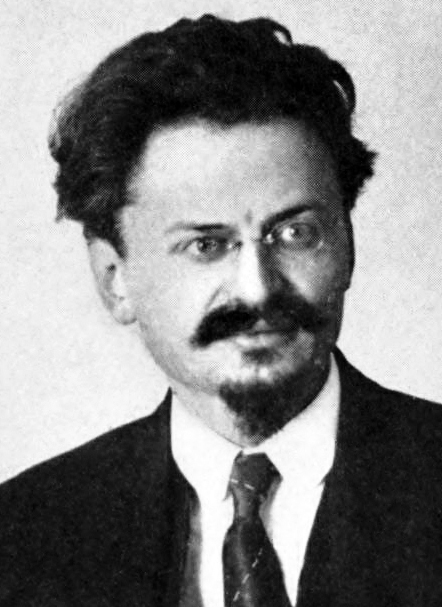Leon Trotsky Frases famosas
Se referindo a URSS
Variante: Em um país cujo único empregador é o Estado, oposição significa morte por fome. O velho princípio daquele que não trabalha não deverá comer, foi substituído por um novo: aquele que não obedece não deverá comer.
Leon Trotsky frases e citações
Página 225.
A revolução traída
Página 240.
A revolução traída
Leon Trotsky: Frases em inglês
Statement of 1924 on Joseph Stalin's growing powerbase, in Stalin, An Appraisal Of The Man And His Influence (1966); also in Stalin's Russia 1924-53 by Michael Lynch, p. 18
“The life of a revolutionary would be quite impossible without a certain amount of "fatalism."”
Foreword (1929) http://www.marxists.org/archive/trotsky/1930/mylife/foreword.htm
My Life (1930)
Fonte: The Revolution Betrayed (1936), p. 40 in Doubleday, Doran & Company edition (1937)
“We Marxist communists are profoundly opposed to the anarchist doctrine. This doctrine is erroneous”
Order by the commissar for military affairs - on the murder of count Mirbach
How the Revolution Armed (1923)
Misattributed
Contexto: : In a later work, Just and Unjust Wars: A Moral Argument with Historical Illustrations (2000) by Michael Walzer, the author states: War is most often a form of tyranny. It is best described by paraphrasing Trotsky's aphorism about the dialectic: "You may not be interested in war, but war is interested in you." This statement on dialectic itself seems to be a paraphrase, with the original in In Defense of Marxism Part VII : "Petty-Bourgeois Moralists and the Proletarian Party" (1942) https://www.marxists.org/archive/trotsky/idom/dm/32-goldman2.htm — where Trotsky publishes a letter to Albert Goldman (5 June 1940) has been translated as "Burnham doesn't recognize dialectics but dialectics does not permit him to escape from its net." More discussion on the origins of this quotation can be found at The Semi-Daily Journal of Economist Brad DeLong: Fair and Balanced Almost Every Day http://econ161.berkeley.edu/movable_type/2003_archives/002422.html.
As quoted in The Cheka : Lenin's Political Police (1981) by George Leggett, p. 54
Into the Fight Against Famine
6. The Kulaks - bulwark and hope of the counter-revolution
How the Revolution Armed (1923)
Fonte: Fascism: What It Is and How to Fight It (1944), Ch. 3
Excerpts of Trotsky’s interview with Jewish Telegraphic Agency (18 January 1937); as quoted in Trotsky and the Jews (1972) by Joseph Nedava, p. 204
https://www.marxists.org/archive/trotsky/1925/07/lenin.htm,Letter on Max Eastman's Book, July 1, 1925
Manuscript from 1940, as translated in Writings of Leon Trotsky edited by George Breitman
Fascism: What It Is and How to Fight It (1944)
Bulletin of the Opposition, October 1933. Quote from Harpal Brar's Trotskyism or Leninism? p. 625
During a 1921 meeting with American businessman Armand Hammer, as quoted in Hammer: Witness to History by Hammer and Neil Lyndon (1988), p. 160
Ch. 11 https://www.marxists.org/archive/trotsky/1936/revbet/ch11.htm
The Revolution Betrayed (1936)
Stalin: An Appraisal of the Man and his Influence (1941), translated by Charles Malamuth, p. 412
Literature and Marxism (1924)
“Bureaucracy and social harmony are inversely proportional to each other.”
Fonte: The Revolution Betrayed (1936), p. 41
